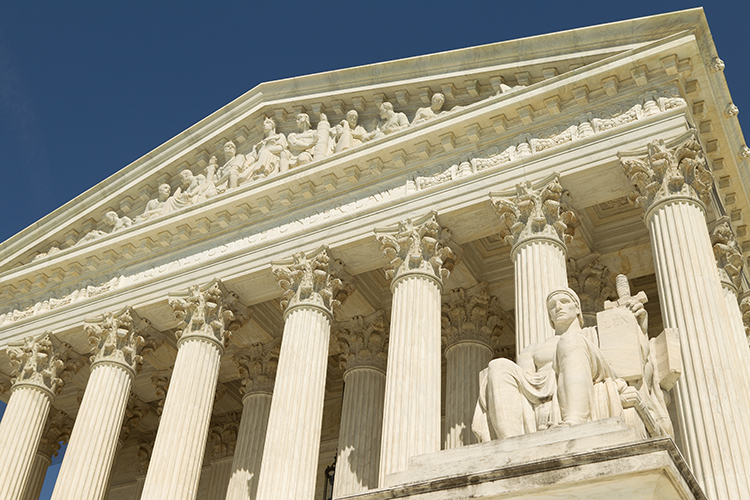Does narrowed question in Trump immunity case benefit special counsel? Some commentators think so

The U.S. Supreme Court avoided former President Donald Trump’s most extreme arguments—including that he has absolute immunity from prosecution for any acts while in office—when it crafted the question presented in its grant of certiorari Wednesday in the special counsel’s case over efforts to overturn the 2020 presidential election. (Image from Shutterstock)
The U.S. Supreme Court avoided former President Donald Trump’s most extreme arguments—including that he has absolute immunity from prosecution for any acts while in office—when it crafted the question presented in its grant of certiorari Wednesday in the special counsel’s case over efforts to overturn the 2020 presidential election.
This is the question presented as crafted by the Supreme Court: “Whether and if so to what extent does a former president enjoy presidential immunity from criminal prosecution for conduct alleged to involve official acts during his tenure in office.”
What is the significance of the narrowed question? Some commentators think that it benefits special counsel Jack Smith.
In a social media thread on X, formerly known as Twitter, Jack Goldsmith, a professor at Harvard Law School, noted that the question focuses on official acts and presidential immunity, rather than absolute immunity.
Goldsmith sees the language as indicating that the high court might be considering a subset of official acts for which a president might get immunity. Those acts could be core functions under Article II or a subset of presidential powers. He speculates that acts carrying immunity might include pardons, firing of officials and self-defensive military action.
“But such a ruling wouldn’t come close to giving POTUS a blank check in office since most official acts would not be core Article II functions,” Goldsmith wrote.
Steve Vladeck, a professor at the University of Texas School of Law, also attributes significance to the phrasing of the question presented.
“My own view is that the [question presented] is written rather carefully to narrow exactly what the court is doing, both to cut out of the case entirely some of Trump’s more … extreme … arguments (like double jeopardy) and to also signal that the court is focused on the official acts question (strongly implying that it has no interest in recognizing any broader immunity),” Vladeck wrote in a Q&A on his One First Substack site.
Even if Trump wins on the narrowed question, there is room for Smith to go forward with the prosecution based on nonofficial acts, Vladeck wrote.
A column in the Washington Post agrees that the “official acts” language means that the Supreme Court could rule for Trump and still leave discretion for Smith to argue that trying to overthrow an election is not an official act.
In a Lawfare blog post written before the cert grant, Martin S. Lederman, a professor at the Georgetown University Law Center, elaborates on why he thinks that there is no serious argument that Trump was acting in his official capacity when he engaged in the alleged conduct.
“For starters,” Lederman wrote, “all but one of the counts of the indictment allege that Trump conspired with others to violate the law through fraudulent conduct. And, with one discrete exception, Trump’s alleged agreements to commit such fraud were with persons outside the government”—including, apparently, four lawyers.
“It’s very hard to see how Trump’s agreements with the five private parties might have been undertaken in his official capacity as president of the United States,” Lederman wrote.
Even if there was such a rare case, “under no possible understanding of a president’s proper role” would an official presidential duty include entering into an agreement to defraud the United States and obstruct its proceedings, he wrote.
Even if the Supreme Court paves the way for prosecution, the timing of its decision could be critical, according to three commentators writing at MSNBC. If the Supreme Court rules in late June, the trial might not begin until September, “making a verdict before the election difficult, if not impossible.”
The MSNBC authors are Norman Eisen, a former House Judiciary Committee impeachment counsel; Joshua Kolb, a former Senate Judiciary Committee law clerk; and Fred Wertheimer, founder and president of Democracy 21.



